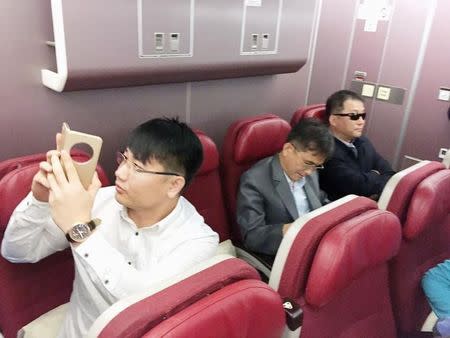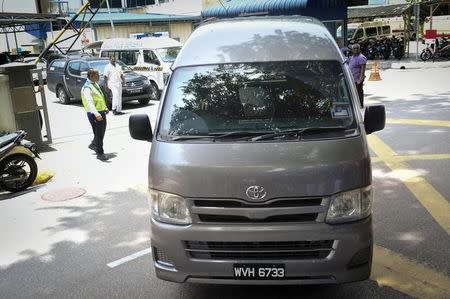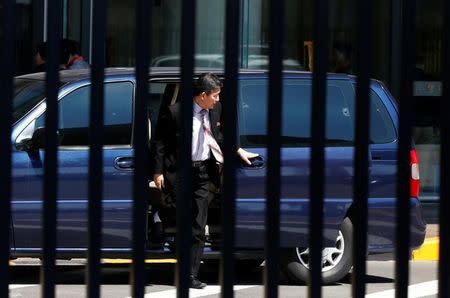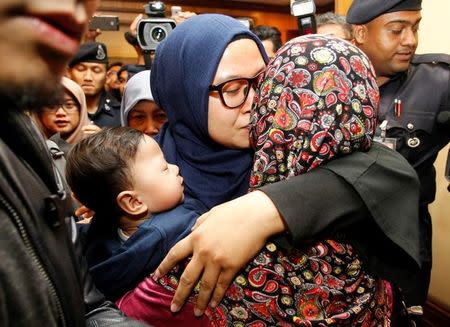North Korean murder suspects go home with victim's body as Malaysia forced to swap
By Rozanna Latiff and James Pearson KUALA LUMPUR (Reuters) - Three North Koreans wanted for questioning over the murder of the estranged half-brother of their country's leader returned home on Friday along with the body of victim Kim Jong Nam after Malaysia agreed a swap deal with the reclusive state. Malaysian police investigating what U.S. and South Korean officials say was an assassination carried out by North Korean agents took statements from the three before they were allowed to leave the country. "We have obtained whatever we want from them...They have assisted us and they have been allowed to leave," police chief Khalid Abu Bakar told a news conference in the capital, Kuala Lumpur, saying there were no grounds to hold the men. Kim Jong Nam, the elder half-brother of the North's young, unpredictable leader Kim Jong Un, was killed at Kuala Lumpur's airport on Feb. 13 in a bizarre assassination using VX nerve agent, a chemical so lethal the U.N. has listed it as a weapon of mass destruction. China's Foreign Ministry spokesman Lu Kang said the remains of a North Korean citizen killed in Malaysia were returned to the North via Beijing along with "relevant" North Korean citizens. Malaysian authorities released Kim's body on Thursday in a deal that secured the release of nine Malaysian citizens held in Pyongyang after a drawn out diplomatic spat. Malaysian police had named eight North Koreans they wanted to question in the case, including the three given safe passage to leave. Television footage obtained by Reuters from Japanese media showed Hyon Kwang Song, the second secretary at the North Korean embassy in Kuala Lumpur, and Kim Uk Il, a North Korean state airline employee on the flight from Kuala Lumpur to Beijing. The police chief confirmed they were accompanied by compatriot Ri Ji U, also known as James, who had been hiding with them at the North Korean embassy in Kuala Lumpur. Malaysian prosecutors have charged two women - an Indonesian and a Vietnamese - with killing Kim Jong Nam, but South Korean and U.S. officials had regarded them as pawns in an operation carried out by North Korean agents. Kim Jong Nam, who had been living in exile in the Chinese territory of Macau for several years, survived an attempt on his life in 2012, according to South Korean lawmakers. They say Kim Jong Un had issued a "standing order" for the assassination in order to consolidate his own power after the 2011 death of the father of both. The other North Koreans named by Malaysian investigators are all back in North Korea. Police believe four fled Malaysia on the same day as the murder and another was held for a week before being released due to insufficient evidence. Angered by the probe, North Korea ordered a travel ban on Malaysians this month, trapping three diplomats and six family members - including four children - in Pyongyang. Malaysia, which previously had friendly ties with the unpredictable nuclear-armed state, responded with a ban of its own, but was left with little option but to accede to the North's demands for the return of the body and safe passage for the three nationals hiding in the embassy. "CLEAR WINNER" Malaysia will not snap diplomatic ties with North Korea following the row, Prime Minister Najib Razak said during an official visit to India, state news agency Bernama reported. "We hope they don't create a case like this again," Najib told reporters in the southern city of Chennai. "It will harm the relationship between the two countries." On Thursday, Najib had announced the return of the body, but did not mention Kim by name. "Following the completion of the autopsy on the deceased and receipt of a letter from his family requesting the remains be returned to North Korea, the coroner has approved the release of the body," Najib said, adding that the murder investigation would continue but the travel ban on North Koreans was lifted. North Korea has maintained that the dead man is not Kim Jong Nam, saying instead the body is that of Kim Chol, the name on the victim's passport. Malaysian police used a DNA sample to establish the victim was Kim Jong Nam. Police chief Khalid said the North Korean embassy had at first confirmed the identity, but changed its stance the next day. The swap agreement brings to an end a diplomatic standoff that has lasted nearly seven weeks. Both countries managed to "resolve issues arising from the death of a DPRK national," a North Korean statement said on Thursday, referring to the country by the abbreviation of its official name. "It is a win (for North Korea), clearly," Andrei Lankov, North Korea expert at Seoul’s Kookmin University, said on the swap deal. "I presume the Malaysians decided not to get too involved in a remote country's palace intrigues, and wanted their hostages back." SIMULTANEOUS TAKE-OFF The nine Malaysians who had been trapped in Pyongyang arrived in Kuala Lumpur early on Friday on board a small Bombardier business jet operated by the Malaysian air force. Pilot Hasrizan Kamis said the crew dressed in civilian clothes as a "precautionary step" for the mission. The Plane Finder tracking website showed the Bombardier took off from Pyongyang at the same time the Malaysian Airlines flight MH360 left Kuala Lumpur for Beijing. Mohd Nor Azrin Md Zain, one of the returning diplomats, said it had been an anxious period but they "were not particularly harassed" by the North Korean authorities. The episode, however, is likely to have cost North Korea one of its few friends. "I think this relationship is going to go into cold storage for a very long time," said former Malaysian diplomat Dennis Ignatius. (Additional reporting by A. Ananthalakshmi, Joseph Sipalan, Emily Chow and Praveen Menon in KUALA LUMPUR and Christian Shepherd in BEIJING; Editing by Simon Cameron-Moore)









